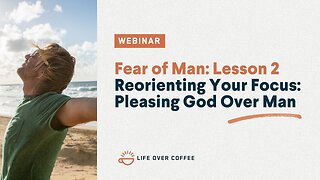Premium Only Content

When the Government Acts Like a Permissive Parent
In the realm of governance and societal leadership, there exists a striking parallel to the dynamics found within the structure of family. This comparison sheds light on the profound impact of leadership styles, particularly when contrasting more liberal approaches with those grounded in structured, principled governance.
Drawing from this analogy, it's observed that a liberal approach can resemble the methodology of permissive parenting, where there is a notable reluctance, or perhaps a fear, to enforce limitations or say "no." This hesitation may stem from a desire to appease or a belief that acquiescence to every whim will curry favor, much like a parent who, out of a misguided sense of love or fear of confrontation, grants their child every request in hopes of affection or obedience.
However, this comparison invites us to consider the wisdom imparted by common sense and reinforced by biblical principles regarding love, discipline, and leadership. Scripture and experience alike teach us that true love often requires us to do and say difficult things for the betterment of those we care for. Proverbs 13:24 (ESV) states, "Whoever spares the rod hates his son, but he who loves him is diligent to discipline him."
This proverb underscores the notion that discipline and structure are not only acts of love but essential for growth and development. Just as children find security and feel loved within the boundaries set by their parents, citizens thrive when leaders provide clear guidelines and parameters that encourage responsibility, accountability, and the common good.
The metaphor of a locomotive running at full power and optimal usefulness on the structure of rails illustrates the necessity of guidelines for maximum efficiency and benefit. Without the rails—symbolizing structure and parameters—a locomotive's power becomes a destructive force rather than a means of progress.
Similarly, granting every desire without consideration for discipline or wisdom does not equate to love but reveals motivations driven by fear, manipulation, or a shortsighted quest for approval. Such an approach can lead to a "love me now and hate me later" scenario, where immediate gratification gives way to long-term resentment and chaos.
The biblical perspective teaches us that God-centered love involves sacrifice, wisdom, and, sometimes, the courage to impose limits for the greater good. This contrasts sharply with a self-centered approach that seeks immediate approval or advantage without regard for the long-term well-being of the individual or society.
The challenge, then, for those in positions of leadership—whether in government, community, or family—is to embody the kind of love that is willing to do and say the hard things. This involves setting parameters, providing structure, and guiding with wisdom, all rooted in a desire for the true flourishing of those they lead.
In essence, leadership that mirrors the biblical understanding of love and discipline promises not only the stability and progress of society but also cultivates a culture of respect, responsibility, and mutual care. As we navigate the tensions between immediate gratification and long-term well-being, let us remember that true love, both in governance and personal relationships, often requires the courage to set limits, guide with wisdom, and act with the common good at heart.
Grace and peace,
Rick
Life Over Coffee exists to bring hope and help to you and others by creating resources that spark conversations for transformation.
Helpful Links
Would you please help keep our resources free by donating here: https://lifeovercoffee.com/donate/
Learn more about our training here: https://lifeovercoffee.com/mastermind-program-overview/
Connect with Us:
Website: https://bit.ly/3yNZc76
Facebook: https://bit.ly/3wGkWQp
Instagram: http://bit.ly/2He98il
Twitter: https://bit.ly/2SF1BQE
Rumble: https://bit.ly/3CotmPt
Pinterest: https://bit.ly/3IcKGuE
YouTube: https://bit.ly/3i0UmND
-
 1:01:16
1:01:16
Life Over Coffee
24 days ago $0.03 earnedFear of Man: Reorienting Your Focus: Pleasing God Over Man, Lesson 2
951 -
 2:58:58
2:58:58
Wendy Bell Radio
7 hours ago9 Steps Ahead
80K108 -
 LIVE
LIVE
LFA TV
16 hours agoTIME FOR A NEW SPEAKER! | LIVE FROM AMERICA 12.26.24 11am EST
5,204 watching -
 1:40:22
1:40:22
Game On!
13 hours ago $4.43 earnedNFL Thursday Night Football Seahawks at Bears EXPERT Picks!
33.3K9 -
 1:50:54
1:50:54
xBuRnTx
3 hours agoWho's Ready for New Years!
23.5K1 -
 12:09
12:09
Tactical Advisor
15 hours agoSmith & Wesson Shield Plus Carry Comp
19.3K1 -
 4:35:25
4:35:25
Father Russell
8 hours agoDelta Force | Not A Woman? | Mad Martigan Time
60.9K5 -
 3:29:42
3:29:42
BrookieMonster
15 hours ago $44.71 earnedChristmas Stream: Marvel Rivals with CallmeSeags 🎄
180K14 -
 LIVE
LIVE
TheSaf3Hav3n
4 days ago| RUMBLES FIRST SUBATHON IS HERE!!! | DAY 4 |
292 watching -
 6:54
6:54
Dr. Nick Zyrowski
3 hours agoHIGH PROTEIN DIET Fixes Your Metabolism! - Weight Loss Not Required
17.7K5